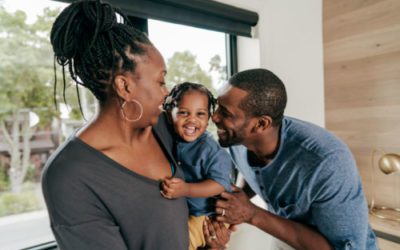
Working through these things is an important part of the adoption process. Here are some things to remember while dealing with grief and loss in adoption.
What is adoption grief like?
Birth mothers who choose adoption for their child will experience a unique form of grief. Disenfranchised grief is when someone’s grief isn’t recognized or validated by others. This often happens when their experience doesn’t fit into society’s expectations around loss. For example, losing someone to suicide, going through a divorce, or even the loss of a pet can lead to this type of grief.
Adoption loss is an example of disenfranchised grief too, but it’s a bit different since it doesn’t involve death. It can feel even more isolating because, while no one plans to get pregnant just to place their child for adoption, the choice to do so often makes people think that the birth parent shouldn’t grieve as much. There’s often a lack of understanding about how painful these decisions can be, even when they’re voluntary.
“Most people anticipate experiencing grief around the end of life, typically following the death of a loved one,” explains Meshan Lehmann, a licensed social worker and author for the National Council for Adoption. “However, fewer are familiar with grief after a healthy birth of a child, when a birth parent has made an adoption plan for their newborn.”
Grief is unavoidable, but hope prevails.
Unlike the grief experienced when losing a loved one to death, adoption grief is more complex. It may feel like grief in the way of separation from a life that you might have known with your child. It might also feel like losing experiences or the opportunity to see your kids through various milestones.
Letting yourself feel grief is good, and it will help you process your decision as time goes on. It is important to sit with your grief for as long as you need to. Your baby will be raised by a loving adoptive family, and because you chose open adoption, you can be a part of your child’s life in whatever way you feel comfortable.
Part of your grief may also include a sense of relief for both you and your child. Birth mothers often report that that relief can be a bittersweet feeling, but let yourself feel it.
“[Adoption] is definitely not only the hardest, but most emotional thing that I have ever done in my life,” shares a Lifetime birth mother in her testimonial. “I miss that boy so much and it’s so difficult to know that I won’t see him grow up and enjoy life. Well, I will but it’ll be from a distance. He’s going to be surrounded by so much love and affection by his adoptive parents and for that, I’m incredibly blessed to have that peace that he’ll be taken care of.”
You made an adoption plan because you thought it was the best pregnancy choice for you both, and it is good to be able to feel that relief now that it is complete.
We understand that adoption is a very emotional experience, so Lifetime will remain available to you after you place your baby for adoption. In addition, Lifetime can connect you with licensed counseling if that’s something you need.
How you deal with grief is unique to you.
Your way of dealing with grief and loss is a personal experience. Grief after placing a child for adoption is different for everyone—just like every baby and every adoption story is unique. Birth parents go through a mix of emotions, and there’s no one-size-fits-all way to experience grief. Feeling sadness or loss doesn’t mean they regret their decision; it’s possible to grieve and still feel confident about choosing adoption at the same time.
Your feelings of grief and loss will not go away overnight. However, there is light at the end of all of it, as many birth mothers will tell you.
“I’d gaze at the twinkling lights on a Christmas tree and wonder how I’d ever survive the holidays without my daughter in my arms. During these moments of agony, I’d find a quiet spot and reflect on my decision to make an adoption plan. I had to remember my “Why.” Why did I place my child for adoption? What were my motivating factors?” writes birth mother Adrian C. Collins. “For me, the answers were clear: 1) I wanted the best life for my child. 2) I loved my child unconditionally. When I am swamped with self-doubt and regret, I have to hold onto my reason, my “Why.”
Even when you are at your saddest, it is important to keep in mind that placing your baby with a caring adoptive family is a healthy and loving choice. Remembering this will give you the inspiration you need to move toward healing.
It will be a journey. Embrace it as a journey that is unique to you. Keep in mind that you can move along in your journey at a pace that feels right to you.
Your strength is more powerful than grief.
Creating an adoption plan and the transition that happens afterward can feel a bit like a roller coaster of emotions. Birth mother and author Adrian C. Collins offers these words of encouragement: “To my fellow birth mom that is struggling with feelings of grief and loss: Find things that bring you joy. Clothe yourself in friendship. Invite a friend to coffee. Go out to a movie. Journal. Join a birth mom support group or befriend a birth mom who is earlier in her adoption journey than you are. Find something that brings a sense of purpose and meaning. Don’t compromise on your worth.”
Open adoption provides a ray of hope for birth mothers who are scared that they will miss out on knowing their child or knowing what they will be like later in life. Many studies, such as this one from 2018 and this one from 2015 show that when birth mothers maintain a connection and stay open with their child, it greatly supports their healing journey.
“Research indicates that ongoing contact with their child alleviates anxieties regarding the child’s welfare and diminishes concerns about feelings of abandonment,” shares social worker Meshan Lehmann, LCSW-C in the National Council for Adoption publication Birth Parent Grief in Adoption. She continues, “Moreover, higher levels of openness in adoption generally correlate with greater satisfaction with the decision to place the child for adoption.”
As you process your feelings, remember first and foremost that it takes an incredibly strong woman to choose adoption for their child. You are that woman! To help maintain that strength, stay surrounded by supportive friends and family members. Talk about your feelings as they surface.
You are making a life-giving choice.
Our domestic open adoption agency gives you, as a birth mother, the ability to determine how you will be involved with your child’s life. You may be signing away your rights to be the primary parent, but you will still get to have contact with your child and see them if that is what you want.
Because of your choice for adoption, your child will get an adoptive family that is excited to raise them and provide a nurturing, loving environment. Your child will also get the opportunity to know who you are.
Plus, if there are questions about backgrounds or medical history, you and your child’s adoptive parents can work side by side to answer those and provide a supportive environment.
Lifetime Adoption
It is no secret that grief and loss will be a part of the multitude of feelings you will experience. This is true for you, for the birth father and extended birth family, as well. But it is important to remember that love is the most powerful thing to embrace.
Open adoption is one of the most loving decisions you can make for your baby. It allows birth parents, adoptive parents, and adopted children to go through the adoption experience together.
Our caring adoption coordinators will help answer your questions and work with you throughout your pregnancy to ensure you have an adoption plan that you are comfortable with. You get to choose the adoptive family, and you designate what the birth and delivery will look like.
Knowing that you can be a part of your child’s life will help relieve some of the adoption grief you are feeling. And in each step of the way, our compassionate team of adoption experts will be with you to help guide you.
Peer Support
One last thing: If you choose peer support, you will be able to speak with your peer counselor as often or as little as you want. She is a birth mother, someone who has been where you are. You decide the level of contact, if any, that you want.
It’s always your decision. You will choose what type of adoption experience you will have. You will also choose the type of relationship you have with your peer counselor.
Lifetime Adoption has been helping birth mothers since 1986. We have a wide range of resources available for you. We will not pressure you to make a decision. Plus, you can use our services at no charge, whether you decide to go through the adoption process or not.
To speak with an adoption coordinator or to talk with one of our birth mother peers, contact us today. The sooner you get started, the sooner you can get your adoption plan together and begin choosing who will have the honor of adopting your baby.
We are ready to speak with you. Call or text Lifetime at 1-800-923-6784, or send us a message.
Editor’s Note: This article was originally published on September 4, 2020, and has since been updated.
As Vice President of Lifetime Adoption, Heather Featherston holds an MBA and is passionate about working with those facing adoption, pregnancy, and parenting issues. Heather has conducted training for birth parent advocates, spoken to professional groups, and has appeared on television and radio to discuss the multiple aspects of adoption. She has provided one-on-one support to women and hopeful adoptive parents working through adoption decisions.
Since 2002, she has been helping pregnant women and others in crisis to learn more about adoption. Heather also trains and speaks nationwide to pregnancy clinics to effectively meet the needs of women who want to explore adoption for their child. Today, she continues to address the concerns women have about adoption and supports the needs of women who choose adoption for their child.
As a published author of the book Called to Adoption, Featherston loves to see God’s hand at work every day as she helps children and families come together through adoption.






as usual birth fathers are just omitted and forgotten it s amazing how we just feel NOTHING at all isn t it?
Lifetime Adoption understands that there is grief and loss for birth fathers as well. We look forward to sharing more from the birth father perspective on our blog in the future.